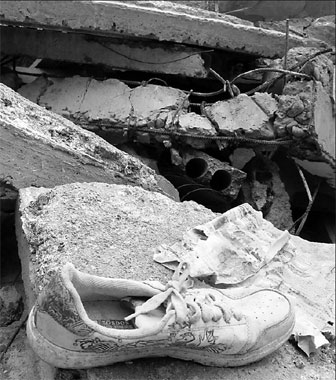Quake made me a better student
|
A student's shoe is found at the wreckage of Juyuan Middle School, Dujiangyan, Sichuan province, after the earthquake on May 12, 2008. Huang Yiming |
It was May 12, 2008. With the conclusion of the school year around the corner, disaster came. Buildings crumbled. Dorms and classrooms emptied in seconds and some frantic people even dashed out of the shower to evacuate the university. The students gathered at an outdoor playground next to the school, where they slept for the next four nights in a sea of tents.
"Maybe after 12 hours we were able to use our cell phones to connect with family. When we made phone calls I was able to find out that my parents and my family were safe," said He Wen, one of 19 Sichuan students chosen to study at Farmingdale State University on Long Island.
Twenty-two-year-old He, a medical student, was at Tong Chi University, where he witnessed dozens of medical emergencies alongside rescue and relief efforts. He came away inspired.
"At that time (the earthquake) I felt that being a doctor was so great. Lots of people came to our hospital to be treated for injuries. For days after the earthquake it was full of people in the hospital. We were volunteers, we helped them."
After the school year finished, He was chosen by the State University of New York (SUNY) China 150 program to go to Farmingdale University in the United States to further his education.
Zhang Liang, who studies dentistry, is one of six SUNY China 150 students at Stony Brook University. "I appreciate this opportunity. To some degree, I study harder now. It's really a different environment here," said Zhang.
"College here has many exams, different tests, quizzes every month. There's a very big difference between the Chinese and American higher education systems, such as how the professors grade you. Here the final exam only accounts for 20 percent of the course grade, compared with 70 or 80 percent in China."
Zhang's group of six likes to stay together and is hesitant to be social. Dormmates sometimes invite them to open mic performances but none are willing to join.
Xin Li, an environmental engineering student, said their "shy nature" make them reticent. "There are many activities, and the students are crazy when they take part in activities, but we are really shy."
E-mail is far more prominent as a communication tool in the United States, said the students. Zhang said that in China phones are the preferred way to contact people and he only checked email when awaiting a specific message. "But studying here, the first thing I do each morning is to turn on my computer and check my email because there could be some important messages, some life-changing news," Zhang said.
Western-style professor-student relationships, which are more personal than in China, are one of the biggest delights for Chinese students.
Zhang Rui, a mathematics major, said Chinese professors are always too busy to contact with students, but at Stony Brook there's many opportunities to get help, if not from professors, then from TA (teaching assistants).
Some Farmingdale students are getting a taste of working life - as peer tutors at a career fair. The jobs give them a chance to practice English in a non-academic setting, said Provost Beverly Kahn. And language and an understanding of Western social settings may be the most important takeaway the students will get in America.
He, the medical student, said that the year's study is a good opportunity to practice English and "broaden my vision and change my way of thinking".
(China Daily 01/05/2009 page8)















